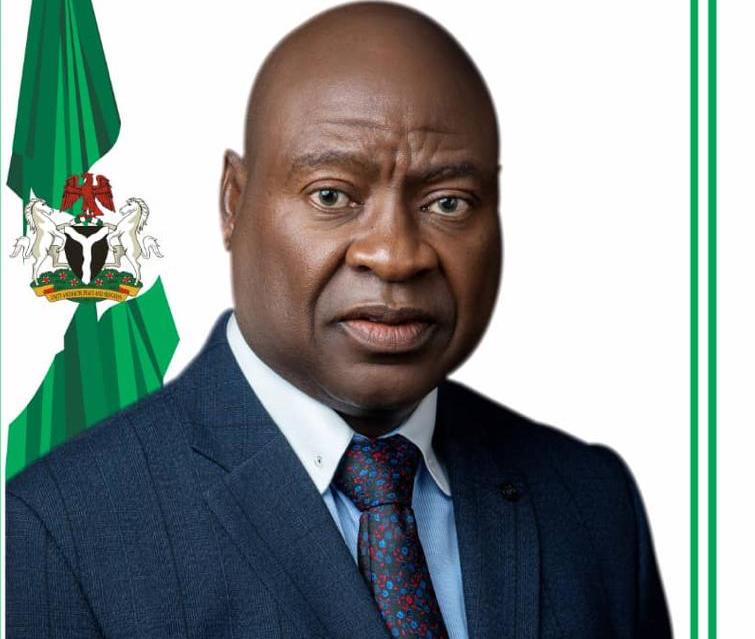For his home-grown initiatives that expanded existing skills acquisition programmes leading to the training and empowerment, in four years, of over 500,000 Nigerians who are today earning sustainable livelihood as paid employers and entrepreneurs, Sir Joseph Ari is the LEADERSHIP Public Servant of the Year 2022
As director-general of the Industrial Training Fund (ITF), Sir Joseph Ari has made his mark as an outstanding public officeholder. Most remarkable of his achievements is the unveiling of the ITF Reviewed Vision: Strategies for Mandate Actualisation. The plan, which was initially slated to terminate in 2022, was, however, reviewed in 2020 to address gaps identified in the course of its implementation, and to appropriately respond to the negative impact of the COVID-19 pandemic on numerous clients.
The plan enabled the ITF to aggressively address service challenges by computerising its operations and tackling infrastructural challenges to expand access to Nigerians desirous of acquiring skills, and generally address a gamut of other structures that were impinging on its ability to effectively discharge its mandate for national economic growth and development and to meet the skills requirement of the nation in line with global best practices.
Ari was appointed director-general/chief executive of the Industrial Training Fund in 2016 by President Muhammadu Buhari, with the mandate to develop a vast pool of skilled manpower sufficient to meet the needs of the public and private sectors of the national economy.
He believes that until most Nigerians are equipped with competitive technical skills, Nigeria as a nation will continue to fight a losing battle against the blights of poverty and unemployment and their attendant consequences. This belief was inspired by success stories from countries like Japan, Germany, Vietnam, Singapore and Brazil which transformed into industrial power-houses using technical and vocational skills acquisition.
With this as his driving principle, Ari hit the ground running by implementing so many home-grown skills intervention programmes, namely: the National Industrial Skills Development Programme (NISDP), the Construction Skills Empowerment Programme (CONSEP), the Skills Training and Empowerment Programme for the Physically Challenged (STEPP-C), the Passion to Profession Programme (P2PP) and the Agri-preneurship Training Programme (ATP).
In all, these programmes have trained thousands of Nigerians for between three and six months in the following trade areas: web design and programming, advanced computer networking, mobile app development, iron bending, masonry, crop production, aquaculture, poultry, air-conditioning and refrigeration, plumbing, GSM repairs and ladies’ wig/cap making.
The ITF, on Ari’s watch, has forged a rare collaboration that has brought synergy to its operations. The Fund is currently in partnership with SENAI of Brazil, Institute of Technical Education Services (ITEES) of Singapore, Galilee International Management Institute (GIMI) in Israel, International Labour Organisation (ILO), United Nations Industrial Development Organisation (UNIDO) and many others as part of further efforts to equip Nigerians with requisite vocational trade skills and lift thousands out of poverty. These partnerships paved the way for the establishment of ITF Model Skills Training Centre (MSTC), Abuja, and many others.
In recognition of his impressive performance, and for effectively repositioning the Fund as a dependable ally of the federal government, particularly with regards to jobs and wealth creation, Ari was reappointed for another four-year term.
Ari is presently on many federal government committees, including the Micro, Small and Medium Enterprise (MSME) Council chaired by Vice President Yemi Osinbajo; he is also a member of the MSMEs Survival Fund for artisans to drive the implementation of the various support schemes for MSMEs in the country as part of the national response to the COVID-19 pandemic and government’s Social Investment Programmes under the Economic Sustainability Plan.
Similarly, the ITF on his watch was among the few agencies requested by the federal government to forward submissions on lifting 100 million Nigerians out of poverty in 10 years. If the proposal which is currently receiving the attention of the authorities is assented to, the ITF will train over 7 million Nigerians in the agriculture, construction and facility maintenance, information and communication technology, manufacturing and services sectors between 2022 and 2031.
Apart from equipping thousands of Nigerians with technical and vocational skills for employability and entrepreneurship, the Fund has produced an indigenous 4G smart mobile cellphone from locally sourced materials which it presented to President Muhammadu Buhari recently. It has also initiated processes for the mass production of the mobile phones as it has moved to install a production line specifically for that purpose at the ITF Model Skills Training Centre (MSTC), Abuja.
Ari also completed and commissioned all abandoned projects of the Fund. They include the ITF Lagos Island Area Office, the Mechatronics Workshop in Kano State, the Area Office Complex in Katsina State, the Central Store Complex, and E-Library Complex at the ITF Headquarters.
Other projects completed include the Gusau, Minna, Aba and Awka Area Office Complexes and Vocational Wings, the Multi-purpose Building in Maitama, Abuja, the proposed Institute of Hospitality Management at Oba Akran in Lagos, Headquarters Auditorium and Gymnasium, the access road to the Headquarters Auditorium and Gymnasium, and a special Agriculture Green House at Ofada-land in Ogun State.



